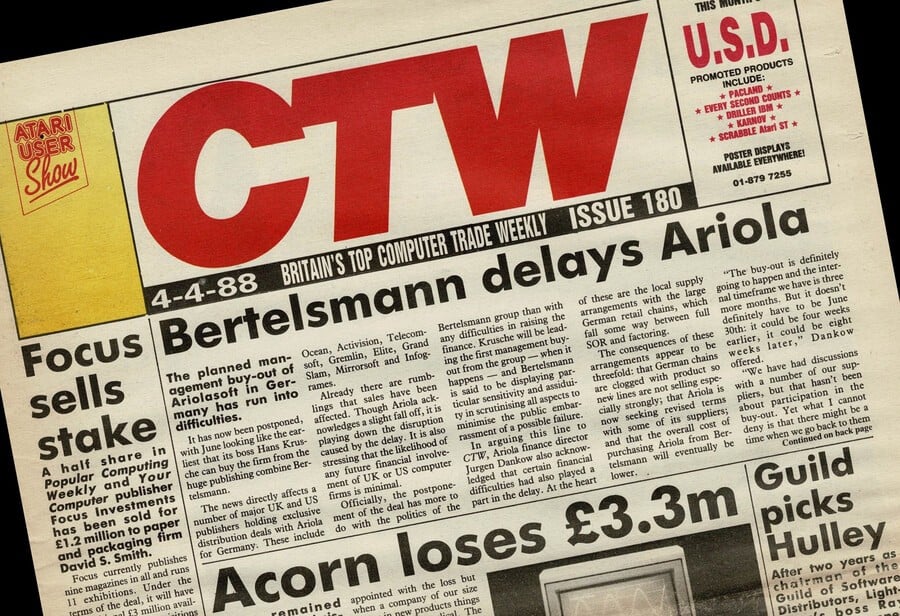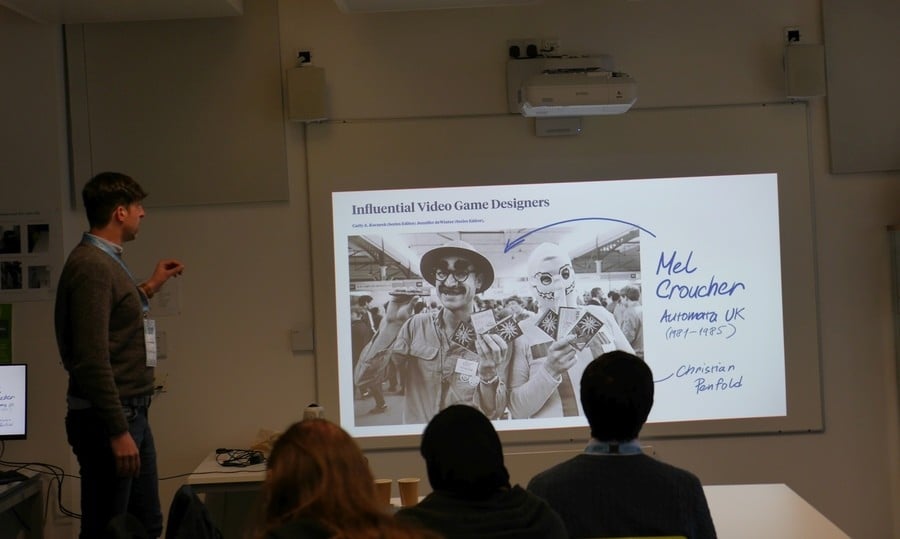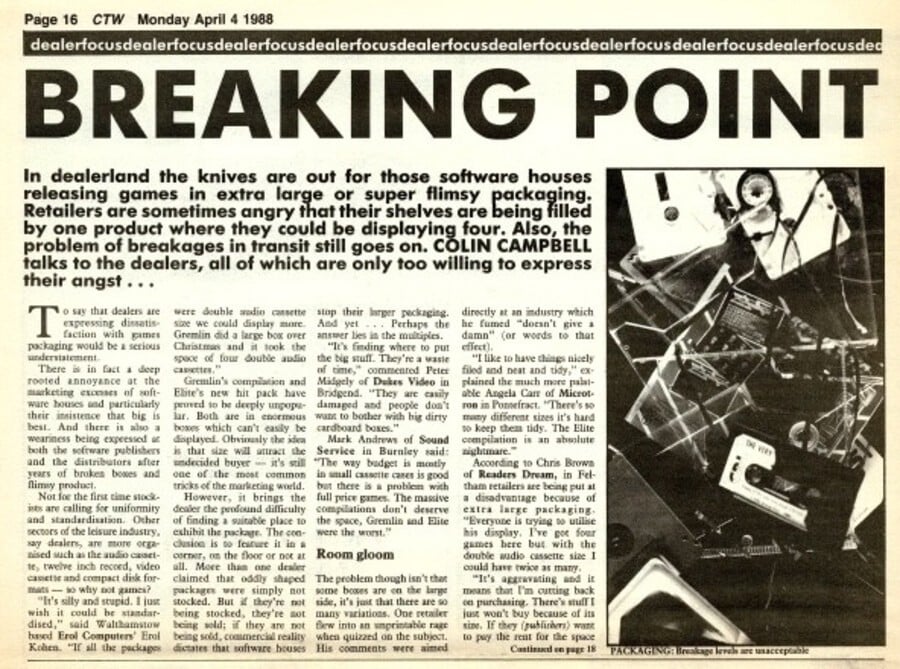
One of the History of Games 2024 conference talks, by Jaroslav Švelch, was on British game developer and journalist Mel Croucher. As Švelch describes it, he has become Croucher's biographer, interviewing him in his home and having access to his large archive of materials.
Croucher is perhaps best known for the games Pimania (1982), Groucho (1983), and Deus Ex Machina (1984) - the last one included an audio tape to be played alongside the game. In later years, Croucher moved into journalism and activism, writing for Crash magazine. Švelch's talk included archive photography, gameplay video, and detailed how Croucher was opposed to censorship but advocated self-regulation, was for nuclear disarmament, and, in many ways, was an outlier in the British games industry and press.
The 20-minute talk was riveting and a great example of investigative research by academics. But that's not the point of this satellite article. Švelch approached me at the conference, asking for my help, believing I would have the answer. Did I know where to find archives of Computer Trade Weekly?
The first assumption is naturally, the Internet Archive? SegaRetro? At the very least the National Archives should have one copy of every printed publication.
"I've checked again," explained Švelch, "And the British Library only has CTW starting from 1994. The National Archive doesn't seem to have anything. I'll send some existing info on the CTW and some clippings that I have. Apparently, it was published from 1984. It would be great if you could pass on the message that this is an essential resource that hasn't been digitised."

This is a horrifying revelation, and very surprising. Gaming Alexandria has bought and scanned countless Japanese magazines. SegaRetro has 532 issues of Japanese arcade trade paper Game Machine, from 1974 to 1996. Rare Japanese publications preserved by English speakers. Surely a British trade paper would have been preserved too? Seemingly not! SegaRetro's first issue is 180 with hundreds of issues missing from the 880 issue run. Besides this there are a few clippings online, and people like Stuart Campbell who put their own work up. There is no comprehensive archive of scans for every issue.
Take a look at the earliest issue on SegaRetro. Industry quotes. Old adverts. Data on pricing and sales charts. Insider news stories. Rare photographs. A contextual snapshot of the zeitgeist of April 1988. The historical value is priceless. Why have these not all been preserved yet?
Given that it was an industry trade paper, the recipients would have been industry people. Who would have stored all of them for 40 years? Jeff Minter maybe? He's a veteran British developer and lives rurally, so might have the space for it. Even Croucher only has clippings related to his own work.
Dr Charlotte Stevens, Lecturer in Media and Communication at Birmingham City University, told me that should a full archive be found, there are apparatus in place to house them. We need to find and digitise them while the paper is still legible.
This article is a call for help. A vital resource of information risks being lost. It may already have been lost. If you have old copies, or know someone who does, please reach out.
Throughout the conference there was a lot of discussion on the gulf between academics, the specialist press, registered preservation groups, and hobbyists or fans. It was stressed that academics rely on and utilise the efforts of amateurs - there is value in the work they do. Something like scanning and archiving magazines, or dumping and preserving game data, has typically fallen to the fan community, working in a grey area around copyright.

Dr Poppy Wilde shared her thoughts: "We have to remember that each level of users and groups are serving equally as important and as valid, but differing commentaries. So academics are obviously very privileged with the time that we have to explore things from a deep theoretical academic research perspective. As you say, we've got fans and historians who are looking at that from another perspective."
This overlap of disciplines, four distinct pillars looking at games history, is fascinating, especially given that they seldom seem to interact directly. I ask if academia would want the fan community to adopt a more scientific method in their work.
Dr Wilde disagrees: "My perspective would be to say, no. Because actually, then, what we would be studying would be an imposition of a cultural archival practice. And fans themselves are doing really interesting work through their curation practices, rather than it being a right or a wrong way."
So if you're reading this, and you toil away scanning or dumping or preserving. Know that your efforts are invaluable. The window to document and preserve the start of the video game industry moves further away with each year.
To give an example of how this has helped academics, Richard Sherriff used a different newspaper, Popular Computing Weekly, along with fan scans of Crash magazine, to correlate sales charts with Crash Smash awards. What he found is that cumulatively, on average, the number of Crash Smash awards each month did not change - however, the presence of these games in the charts did decline markedly.
The research is a work in progress, with various theories on why. First, it's important to know who collated the charts: for the first six months, the Spectrum charts for PCW were by a small retailer, Buffer Computer Shop. Then it swapped over to WH Smiths, who, to a degree, were able to manipulate the market. Then it was Boots. Then, in September 1985, it was Gallup, which Sherriff suggests was the most reliable in terms of accuracy.
Apart from the reliability of the charts, it's possible that there was buyer fatigue after a time, with so many Crash Smash awards, or possibly the declining prominence of the ZX Spectrum and Crash magazine in the overall market. At the very least, it suggests the enthusiast press had a declining influence on consumer purchasing as the decade went on. Further research is needed.
But as you can see, academics such as Švelch and Sherriff are relying on materials which, for the most part, have been preserved by the fans. Sherriff states in his talk we are lucky they've done this.
Please help address this glaring void in British computing history. Do you know where to find the missing issues of Computer Trade Weekly?
